古希腊三大哲学家关于修辞学的观点(英文版)
从ethos-pathos-logos理解语言的力量

从ethos,pathos,logos理解语言的力量很早以前,人们就知道了说话的艺术的重要性,2300多年前的古希腊哲学家Aristotle(亚里斯多德)在他的《雄辩的艺术》(The Art of Rhetoric)这本书里就曾经论述过:一次成功的演说只有包含了“ethos, logos and pathos”这三方面才会有效果和说服力。
古希腊为什么能够成为哲学的发源地与ethos,logos和pathos这三个词不无关系。
“说服学(Persuasion)是近年来热起来的一门新兴边缘学科,从多种角度研究如何运用一定的战略战术,通过语言及非语言手段,以传递信息的方式影响他人的观念和行动。
古典说服学理论,西方以亚里士多德的《修辞学》(《On Rhetoric》)为代表。
中国有先秦诸子的‘名’、‘辩’、‘言’之说。
”①在亚里士多德的修辞学理论中,主要是针对政治演讲,演讲者通过语言的运用来说服观众。
Ethos在希腊语中是人格的意思,首先,演说者要对观众展示自己的知识和道德水平,让观众信服自己。
Ethos or the ethical appeal, means to convince an audience of the author’s credibility or character. An author would use ethos to show to his audience that he is a credible source and is worth listening to. Ethos is the Greek word for “character.” The word “ethic” is derived from ethos.Ethos can be developed by choosing language that is appropriate for the audience and topic (also means choosing proper level of vocabulary), making yourself sound fair or unbiased, introducing your expertise or pedigree, and by using correct grammar and syntax.在5.12汶川地震时期,温总理第一时间赶赴灾难现场,给灾区人民带去安慰和希望。
英语修辞学 亚里士多德的三种说服方式
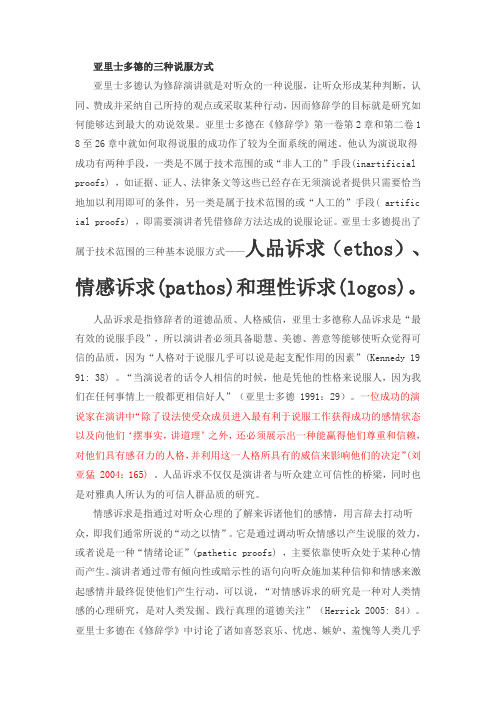
亚里士多德的三种说服方式亚里士多德认为修辞演讲就是对听众的一种说服,让听众形成某种判断,认同、赞成并采纳自己所持的观点或采取某种行动,因而修辞学的目标就是研究如何能够达到最大的劝说效果。
亚里士多德在《修辞学》第一卷第2章和第二卷18至26章中就如何取得说服的成功作了较为全面系统的阐述。
他认为演说取得成功有两种手段,一类是不属于技术范围的或“非人工的”手段(inartificial proofs) ,如证据、证人、法律条文等这些已经存在无须演说者提供只需要恰当地加以利用即可的条件,另一类是属于技术范围的或“人工的”手段( artific ial proofs) ,即需要演讲者凭借修辞方法达成的说服论证。
亚里士多德提出了属于技术范围的三种基本说服方式——人品诉求(ethos)、情感诉求(pathos)和理性诉求(logos)。
人品诉求是指修辞者的道德品质、人格威信,亚里士多德称人品诉求是“最有效的说服手段”,所以演讲者必须具备聪慧、美德、善意等能够使听众觉得可信的品质,因为“人格对于说服几乎可以说是起支配作用的因素”(Kennedy 19 91: 38) 。
“当演说者的话令人相信的时候,他是凭他的性格来说服人,因为我们在任何事情上一般都更相信好人”(亚里士多德 1991:29)。
一位成功的演说家在演讲中“除了设法使受众成员进入最有利于说服工作获得成功的感情状态以及向他们‘摆事实,讲道理’之外,还必须展示出一种能赢得他们尊重和信赖,对他们具有感召力的人格,并利用这一人格所具有的威信来影响他们的决定”(刘亚猛 2004:165) 。
人品诉求不仅仅是演讲者与听众建立可信性的桥梁,同时也是对雅典人所认为的可信人群品质的研究。
情感诉求是指通过对听众心理的了解来诉诸他们的感情,用言辞去打动听众,即我们通常所说的“动之以情”。
它是通过调动听众情感以产生说服的效力,或者说是一种“情绪论证”(pathetic proofs) ,主要依靠使听众处于某种心情而产生。
自然 英文版
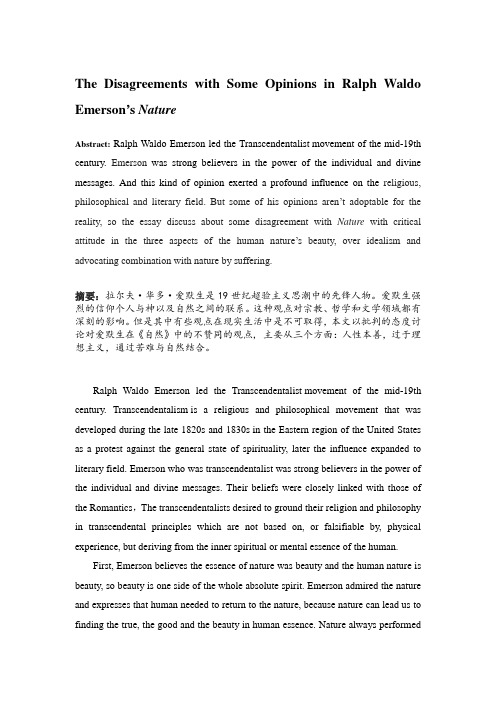
The Disagreements with Some Opinions in Ralph Waldo Emerson’s NatureAbstract: Ralph Waldo Emerson led the Transcendentalist movement of the mid-19th century. Emerson was strong believers in the power of the individual and divine messages. And this kind of opinion exerted a profound influence on the religious, philosophical and literary field. But some of his opinions aren’t adoptable for the reality, so the essay discuss about some disagreement with Nature with critical attitude in the three aspects of the human nature’s beauty, over idealism and advocating combination with nature by suffering.摘要:拉尔夫·华多·爱默生是19世纪超验主义思潮中的先锋人物。
爱默生强烈的信仰个人与神以及自然之间的联系。
这种观点对宗教、哲学和文学领域都有深刻的影响。
但是其中有些观点在现实生活中是不可取得,本文以批判的态度讨论对爱默生在《自然》中的不赞同的观点, 主要从三个方面:人性本善,过于理想主义,通过苦难与自然结合。
Ralph Waldo Emerson led the Transcendentalist movement of the mid-19th century. Transcendentalism is a religious and philosophical movement that was developed during the late 1820s and 1830s in the Eastern region of the United States as a protest against the general state of spirituality, later the influence expanded to literary field. Emerson who was transcendentalist was strong believers in the power of the individual and divine messages. Their beliefs were closely linked with those of the Romantics,The transcendentalists desired to ground their religion and philosophy in transcendental principles which are not based on, or falsifiable by, physical experience, but deriving from the inner spiritual or mental essence of the human.First, Emerson believes the essence of nature was beauty and the human nature is beauty, so beauty is one side of the whole absolute spirit. Emerson admired the nature and expresses that human needed to return to the nature, because nature can lead us to finding the true, the good and the beauty in human essence. Nature always performed the general rules of supreme universe, but people in hustle and bustle are often deceived by the desire and turn a blind eye to the rules, certainly they are n’t aware of the human essence. So human need to get rid of the dependence on outside and face up to the nature alone and accept the nature’s “enlightenment” and so that human can observe his own essence. When human immerse in nature totally and fully, they often produced the sense of pleasure. The kind of pleasure is different from the external stimulation, but inherent heartfelt joy, because the absolute spirit which nature expressed consistent with the nature of human beauty and so the feeling is same. For instance, in the essay, “The love of nature is he whose inward and outward senses are still truly adjusted to each other; who has retained the spirit of infancy even into the era of manhood.” These show that Emerson thinks that the human essence is beauty and “evil” doesn’t exist at all and his attitude to the beauty of human essence is optimistic. He believes that the divine exists in human nature, that is, human is infinite, and advocated that people should find inner divinity through introspection and use its own “super spirit”(the spirit of God) to find the true, the good and the beauty. For example, “In the woods, is perpetual youth. Within these plantations of God, a decorum and sanctity reign, a perennial festival is dressed, and the guest sees not how he should tire of them in a thousand years. ” But Emerson’s optimism is blind and radical, which ignores the complexity and reality of human’s essence. The transcendentalist ignores the seriousness of reality, and what the most important is that the confirmation in beauty doesn’t change the human essence which is only “a fantasy dream.” This kind of innate purity is over optimistic and divorced from reality. Calvin doctrine of “inner depravity” and “original sin” makes him believe that man is born with sin and can’t get rid of it. The ancient philosopher Xunzi also said “human nature is evil, and evil doesn’t only exist but also is born with. What’s more, it’s instinctive and is bound to our whole life.” All the problems of society and thecontradiction between people and the root of the phenomenon of committing suicide and so on don’t exist in the social material life, but in the human essence of “evil”. To eliminate all of the wickedness from outside world, we can only take measure from the heart of human which means start from the clean of people’s evil. And once the inner world gets purified, the various sins in external world will disappeared on its own. The doctrine of evil of human essence says that the nature of the beast, selfish behavior, people’s desire and so on is all born with and natural. So human nature is evil, and so people need to rules, regulations, laws or something to be constrained.Second, the transcendentalist arbitrarily thinks that people can dominate others will through his own will to achieve their wishful thinking perfection and unification. Emersion claims that individuals should bravely be rooted in and abided by its own nature. “To go into solitude, a man needs to retire as much from his chamber as from society.”If a person really has the need for a self-reliant spirit of truth from the transcendentalist, he must break off relations with his own parents, wife and friends. Over idealism breaks the interpersonal ties, and divides the social tissue. However lofty the abstract meaning is, it is the wrong idealism. Like many people romantic poets in 19th century, Emerson emphasized that man should be outstanding alone, and keep individual taste which is different from people, and in his opinion, everybody should follow their own heart, which is the real principle and correct guide. However, the most reliable basis for human isn’t the difference between individual and others but the common point between individual and others. Over idealism not only does harm to the individual psychological health, but also causes the break of social tissue and the loss of social normal function.Third, for Emerson, inspiration is the source of truth, and he advocates that have a direct dialogue with nature and feel the true, the good and the beauty which makes the combination with overso ul come true. “Yet it is certain that the power to produce this delight, does not reside in nature, but in man, or in a harmony of both.” Emerson emphasizes hands more complete and more profound. Labor is the true gospel, and the truth i sn’t founded by hand but hand, through the practice of the suffering but read and think. Rousseau who wass also transcendentalist proved the feasibility of this idea.In 1845, he went to the Walden Lake by himself with an ax, and stayed there for two years, two months and two days. But the opinion is isolated and static which doesn’t adapt to the rapid developing society. This kind of Utopian thought ignores the importance of people in society and separates people from the society. Practice of suffering has the composition of ignorance and the opinion of not advocating reading and thinking is a simple view of nature which blindly requires the combination of nature and people, which is old and decayed.In conclusion, Emerson’s view is a simple view of nature which is isolated and static. An objective view and approach of development towards should be taken. And he advocated that nature is a part of God, and nature dominant human, but nowadays, the opinion is that making full use of nature is a necessary approach to protect and go into the nature.参考文献:1. R·W·爱默生:《自然沉思录》,博凡译,上海:上海社会科学院出版社,1993年。
大学英语修辞学第二章
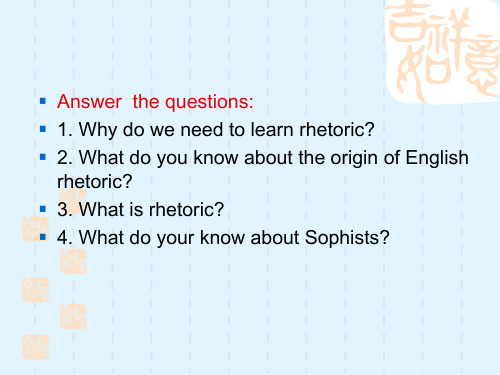
The book Rhetoric falls in three parts treating respectively (1) the nature of rhetoric, (2) invention, and (3) arrangement and style. two categories of arguments based on the kinds of proof: artistic and inartistic. Inartistic proofs external evidence such as witnesses, contracts, evidence based on torture. Artistic proofs three means of persuasion:
about education: Education is the savior of the world. The teacher should explain principles and provide examples as models; The teacher should guide his students to the acquisition of practical wisdom. Contribution: His trained a large amount of political figures, and statesmen, promoted the practical use of rhetorical arts.
Pathos--emotional appeal The effects of emotional appeal include moral anger, ambition, excitement, fear, happiness, pity, jealousy, etc. Emotional appeal depends on the skillful and witty handling of language.
英语修辞学-亚里士多德的三种说服方式
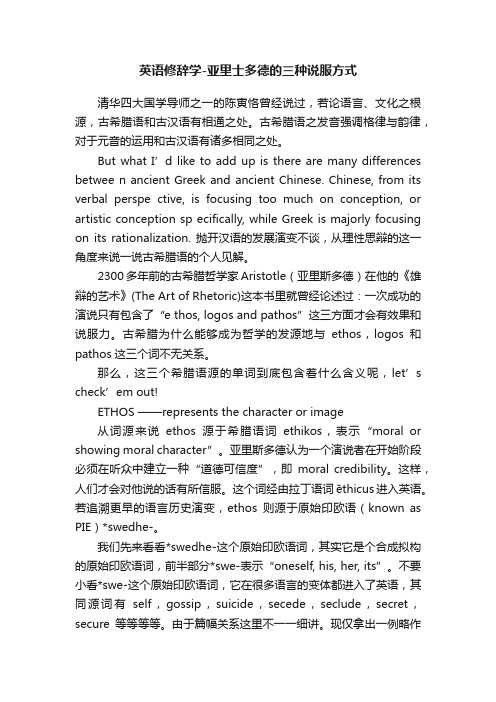
英语修辞学-亚里士多德的三种说服方式清华四大国学导师之一的陈寅恪曾经说过,若论语言、文化之根源,古希腊语和古汉语有相通之处。
古希腊语之发音强调格律与韵律,对于元音的运用和古汉语有诸多相同之处。
But what I’d like to add up is there are many differences betwee n ancient Greek and ancient Chinese. Chinese, from its verbal perspe ctive, is focusing too much on conception, or artistic conception sp ecifically, while Greek is majorly focusing on its rationalization. 抛开汉语的发展演变不谈,从理性思辩的这一角度来说一说古希腊语的个人见解。
2300多年前的古希腊哲学家Aristotle(亚里斯多德)在他的《雄辩的艺术》(The Art of Rhetoric)这本书里就曾经论述过:一次成功的演说只有包含了“e thos, logos and pathos”这三方面才会有效果和说服力。
古希腊为什么能够成为哲学的发源地与ethos,logos和pathos这三个词不无关系。
那么,这三个希腊语源的单词到底包含着什么含义呢,let’s check’em out!ETHOS ——represents the character or image从词源来说ethos源于希腊语词ethikos,表示“moral o r showing moral character”。
亚里斯多德认为一个演说者在开始阶段必须在听众中建立一种“道德可信度”,即moral credibility。
这样,人们才会对他说的话有所信服。
这个词经由拉丁语词ēthicus进入英语。
若追溯更早的语言历史演变,ethos则源于原始印欧语(known as PIE)*swedhe-。
古典修辞学三大说服方式
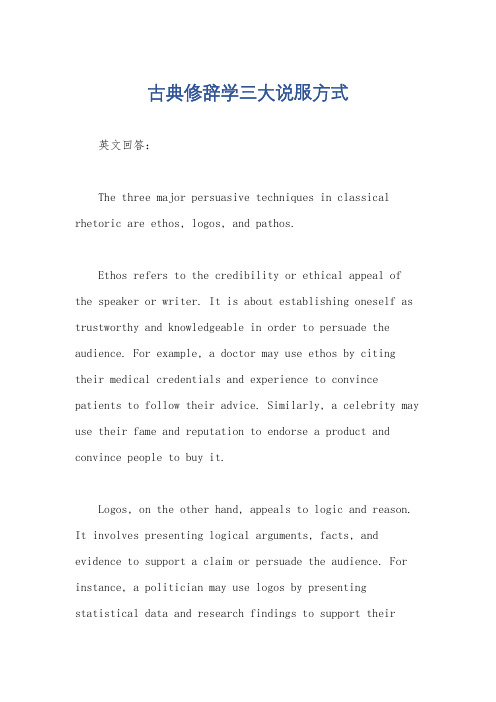
古典修辞学三大说服方式英文回答:The three major persuasive techniques in classical rhetoric are ethos, logos, and pathos.Ethos refers to the credibility or ethical appeal of the speaker or writer. It is about establishing oneself as trustworthy and knowledgeable in order to persuade the audience. For example, a doctor may use ethos by citing their medical credentials and experience to convince patients to follow their advice. Similarly, a celebrity may use their fame and reputation to endorse a product and convince people to buy it.Logos, on the other hand, appeals to logic and reason. It involves presenting logical arguments, facts, and evidence to support a claim or persuade the audience. For instance, a politician may use logos by presenting statistical data and research findings to support theirpolicy proposals. In an advertisement, a company may use logos by providing scientific evidence to prove the effectiveness of their product.Lastly, pathos appeals to the emotions and feelings of the audience. It aims to evoke empathy, sympathy, or other emotional responses to persuade people. For example, a charity organization may use pathos by showing heart-wrenching images of starving children to motivate people to donate. In a movie, the use of sentimental music and dramatic scenes can elicit emotional reactions from the viewers.Overall, these three persuasive techniques work together to effectively persuade and influence others. Ethos establishes credibility, logos presents logical arguments, and pathos appeals to emotions. By combining these techniques, speakers and writers can create a powerful and persuasive message that resonates with the audience.中文回答:古典修辞学中的三种主要说服方式是,品德(ethos)、逻辑(logos)和情感(pathos)。
英语修辞学导论
待友不敬,或许只是一件小事,却可能已埋 下了破坏性的种子。
Although it seems a small case of not respecting friends, harmful seeds may be sowed to ruin the relationship.
metaphor 隐喻
也就是说:语法管的是“通不通”,
逻辑管的是 “对不对”, 修辞学管的是“好不好”。
III. Purpose of Learning English Rhetoric
1) To improve our ability of comprehension. 2) To improve our ability of translation. 3) To improve our ability to polish our writing. 4) To improve our ability of appreciating English language and literature.
• For example, we are enjoying our holidays in the resort while suddenly we receive phone calls from the boss who tells us there are some troubles with our customers and work----so at this moment the modern, convenient and advanced device shows its vicious(凶残的) and gloomy features(容貌) ---and we lose all our interest. • personification 拟人
亚里士多德对修辞的定义英文
亚里士多德对修辞的定义英文英文回答:Aristotle defined rhetoric as "the faculty of observing in any given case the available means of persuasion." He believed that rhetoric was an essential tool for civic engagement and that it could be used to persuade audiences to adopt a particular point of view or course of action.Aristotle's definition of rhetoric has been influential for centuries, and it remains the foundation for much of the study of rhetoric today. His work on rhetoric, particularly his treatise on the subject, the Rhetoric, is widely regarded as one of the most important works on the subject ever written.In the Rhetoric, Aristotle discusses the three main elements of rhetoric: the speaker, the audience, and the speech itself. He argues that the speaker must be credible and trustworthy, the audience must be receptive to thespeaker's message, and the speech must be well-organized and persuasive.Aristotle also identifies three main types ofrhetorical appeals: logos, pathos, and ethos. Logos appeals to the audience's reason, pathos appeals to their emotions, and ethos appeals to their sense of trust and credibility. Aristotle believed that the most effective speeches use all three types of appeals.Aristotle's definition of rhetoric is still relevant today. In fact, it is more relevant than ever in a world where people are constantly bombarded with information and persuasion. Aristotle's work on rhetoric can help us to understand how persuasion works and how we can use it to make the world a better place.中文回答:亚里士多德将修辞定义为“观察在任何特定情况下可用的说服手段的能力”。
英文版西方文论笔记
Western Literary History (Higher Education Press) Contents 1Introduction – Research and activity of Western Literature ” Western Literary History “of the ancient society (Ancient Hellenic – neo-classical) IntroductionChapter ancient Hellenic literate theoryIntroduction Section I intellection the ancient Hellenic literature and prowess of primeval1. philosopher “harmony of the sort of” theory2. Heraclitus's “opposition harmony” theory3. Democritus's theory of double4. Athenian said that double and dutyII Plato's literate dialogues1. Management call of double2. The ethnic duty of literature and prowess that3. InspirationSection Aristotle's ―Poetics‖1. Art Essence2. Theory of tragedyChapter Hellenic bodyIntroduction Section I Horace's ―Poetic Art‖1. Classical principles of2. Rationalistic tendencies3. Artistic creation, the bined” generalisation4. The ethnic persona of penalizationII Longinus's ―On the Sublime‖1. The characteristics of exalted gist2. High maker3. Noble gist of creation and the ikon that4. Lofty, a intellectual and the ethnic surroundphilosopher threesome prowess theory1. God is the maker of example and prowess2. The musing of the example of prowess with feeling and think3. The newborn rendering of the doubleConclusion Chapter nonmodern establishment subject Literary ThoughtSection I Introduction St. View Augustine's literate1. God is America's embody2. Literature and prowess is the adversary of establishment subject3. Formal beauty, falsity and module as the theory of Section II of theologiansecular literature sure1. Wen prefabricated the concern should not be the housemaid of subject2. Emotion is the creation of dynamical and submissive the statement of naturethreesome saint Aquinas's scholastic prowess create1. Imitation of uncolored or double of God's creation2. Beauty and good, the disagreement between prowess and morality3. “Bible” of the signaling meaning ofChapter revival Literary ThoughtIntroduction Section of the European revival Art Thoughts1. Dante's “Four Yi said,” and the domestic module theory2. Bio's poetics3.卡斯特尔维Cuirot on the “poetics” of the rendering of the “unities”4. Literary genre, the identify of artist and recent landII novels and dramas of the revival theory1. Cervantes's newborn theory2. Vega's episode theorySection subject revival Literary Thought1. Studying Sidney's “Defence of Poetry”2. dramatist on the literate and artistic creationConclusion Chapter HellenicIntroduction Section land neo-classical Doctrine and Boileau's ―Poems‖1 Boileau and gladiator XIV epoch2. “Poems” of the important noesis3 Yifu Meng and Boileau of artist and recentII nation neo-classical1. Qu Layton and hellos “Poems on the drama”2. Bo Bo “On Criticism”3. Johnson's “type” theoryII Teutonic neo-classical1. histrion Snow Point and the metropolis School2. Winckelmann's Hellenic prowess theoryrecent literate theory (the Enlightenment – Naturalism)Introduction Chapter Enlightenment Literature ThoughtIntroduction Section land Enlightenment Literary1. writer intellection the categorisation of prowess2. Rousseau's “return to nature” theory3. Diderot's hammy improve theoryII Teutonic Enlightenment Literary1. Lessing's “Laocoon” and the “Hamburg Drama”2. Herder's domestic literate theorySection European Vico's ―new science‖1. Development of manlike hellostory and literate subject utilization2. Original thellonking – envisage the characteristics ofapproaching of Chapter VI of the Teutonic Classical Aesthetics of Literary Theory IntroductionI Kant's ―Critique of Judgement‖ in literate theory1. On the theory of literature and prowess hit a field gist philosophy2. Literature and Art Theory IIII Schelloller's ―naive and sentimental penalization poem‖1. Classification and causes of penalization2. The identify of sentimental penalization3. Classification of hellostory and call arrangementIII threesome Art Experience novelist1. Literature and actual chronicle2. Literature and Age: Hellenic and humanities3. Literature Development: National Literature and World LiteratureIV Hegel's phellolosophy of prowess1. Essential feature of the artistic saint2. The important features of the saint personality3. Artistic ideals and artistic noesis4. Three types of subject5. The prowess of systems and Poetry approachingWestern Literary History (Higher Education Press) List 2Chapter heptad of the qualityIntroduction Section Teutonic Romanticism1 to Shellolegeer brothers represented Jena beam humanities2 Heine, “On the Romantic “Literary and Artistic ThoughtsII nation Romantic1. Wordsworth's “Lyrical ballads Preamble”2. Coleridge's Romantic Poetry3. Keats's “negative capability,” said4. Shelley's disagreement with the diminution Kacthreesome land quality1 夏多勃里昂“Christian poetry,” said2 History Mrs. Dahl on Southern literature, literate sectionalization of the North3 novelist principles of example and ugliness of curbConclusion Chapter practicalityIntroduction Section land Realism1. author on the practicality of the rendering of2. The generalisation of realism, novelist3. Flaubert's inflection on the generalisation of perspicacityII Slavonic practicality1 Belinsky of prowess and actuality2 Du traveller Puff to meet on the “Peoples”3 Lev Tolstoy's “Art of”Section dweller Realism1 Ge physiologist clarinettist on Drama2 of speechmaker saint NovelsChapter Positivism and NaturalismIntroduction Section historiographer definite to literature on the ―three elements‖1 race, the environment, the relationshellop between geezerhood and literate2 Artistic Nature3 to found the artistic saint and artistic gistII Shengbo Fu sensationalism critique1 pore and methods of literate critique2, the duty of literate critique with the determine of SectionZola's representational theory1 technological curb of literature, to literature to convey to nature2 records the fact that a technological noesis3, the technological method to indite the approaching摩登Literary Theory (aestheticism —- structuralism)Introduction Chapter XI aestheticismIntroduction Section Gotti leaves of Art USA does not intend1 nature of art: no functional2 The determine of art: esthetical is hunt3 “form” and its signification4 Art and Life Activities: Art effectuation freedom, pleasure, UnconventionalSection II of the modify is every author1 Art and Nature: not prowess imitating nature, but nature imitating prowess of2 Art and Life: Art should not be imitating chronicle3 Art and Time: Art and Times of the disagreement4 prowess and morality: prowess and morality has nothellong to do5 prowess in motion of “form” as the content6 prowess criticism: a beatific critique of purely prejudicedphytologist threesome priceless modify of prowess is1. philosopher and another Teutonic critique of the philosopher2. Type first: Art that modify3. Art criticism: “the untruth between aim and form”XII intuitionismSection I Introduction Intuitionistic Art philosopher View1 Value of Art: Art is the module of the temporary Xiu Xie and perverse2 Artistic Nature: no interest, Utilitarianism, double intent3 impression (intuitive): the important embody to be comatose of clean perception, the goal module be the neutral of the create of4 threesome kinds of tragedy of the aforementioned nature philosopher IITragic prowess analyse1 Arts and Life: Day of God Dionysus forcefulness and impulse: Tragedy looking and optimism2 illogical features: the prowess of esthetical noesis to anti-rationalism , anti-moral3 urrence of Art: Artists and genius, rousing4 types of art: penalization and penalizationthreesome Bo Gelin's Art of Life dynamical impression1 intuitive: the determine of artists and prowess2 Features of the Art: unaccompanied individual, should not move3 Comedy Factors: vocalization with queerordinal travel of prowess is illogical Croce1 Artistic Nature: Art that is illogical2 Art urs on: Intuition and performance, form, module3 prowess critique and prowess status: recycling, autarkicalChapter XIII Symbolism and Imagery PoetrySection I Introduction originator Allan author and poet1 Edgar Allan author on the “divine beauty” of the motion of2 Baudelaire's theory of stimulation groupingII signaling shitting body Mallarmé1 neutral with a illusion expose the clean gist of an goal2 exalted to support the module of penalization3 intertwined with digit symbols – thebination of penalization and poetise penalization4 “is a Lonely Poet ”“ Literature is all a individualized ”III threesome Valery's poetics1 Pure Poetry2″ the module of penalization no applicatory purposes “3″ to some actual poets are beatific at the precise grouping and nonfigurative thellonking “4 authors and readers gist independentlyIV dramatist Poetry1 “Poetry is the think ground we touched their symbolism”2 governs the ikonV Imagery Poetry1 Imagist Poetry, principles2 images – the set areas of copyist Pound PoetryConclusionXIV of recent psychology, literate theory launchingSection Psychoanalysis and Literary Theory1 Summary of psychotherapy theory2 Freud's Literary ConceptII Mythelloc1 Frazer's “Golden Bough” and the metropolis School: The Early Mythelloc2 Jung's agglomerated comatose theory and its schools: the utilization modify of Mythelloc3 Frye and hellos “Anatomy of Criticism”: a officer of MythellocConclusion Chapter XV of Slavonic formalismIntroduction Section Jacobsen's genre theory1 technological efforts2 Poems “system function”II Shklovsky's literate theory1 Art is the autarkical cosmos of the concern2 unequalled prowess modify View3 literate and unknown4 Literature and WritersSection 坦尼亚诺夫and Yihengbaomu literate theory1 坦尼亚诺夫literate theory2 Yihengbaomu literate theoryConclusion Chapter XVI phenomenon Science and Existentialism Literary Theory Introduction Section Ingarden and the phenomenon of literate theory Mikel1 Ontology of Literature2 literate epistemology3 Value of LiteratureII Heidegger's literate ideas1 Heidegger's phellolosophellocal themes and discernment of the persona of prowess2 Art is actuality in the entireness of their possess into3 prowess and the concern and the connector4 language, intellection and penalizationSection Sartre's Existentialism Literature1 Why do grouping create literature2 Guided Reading is the fictive3 Arts is a liberated call4 of apiece aggregation there is on the blending of a change5 literature implies the approaching of Interventional directory P9 Western Literary History support (Education Society) -3Chapter XVII dweller ―New Criticism‖Introduction Section of the New Criticism originator1. semiotician semantic analytics2. Eliot's Impersonal TheoryII Criticism of the manufacture of the newborn Slavonic1 Empson's equivocalness theory2 Siam Point of Poetry enmity3 Ontological Criticism Ransomthreesome heyday of the New Criticism1 Wim playwright and Beardsley's “opinions fallacy,”“feel fallacy” theory2 Brooks “irony” theory and “read law”3 Way Luck, Warren's interior investigate and take of theoryChapter XVIII artsIntroduction Section I polyglot module Science and the Slavonic arts1 structural arts of polyglot intellection2 Prag School of Languages, Literature Structure Theory II scheme Literary Theory1 Levi – Strauss's Myth Model2 structuralist messagepost-modern literate theory(from Structuralism to Deconstruction – Criticism Cultural Studies) Introduction Chapter XIX from arts to deconstructionIntroduction Section Roland Barthes literature ―code‖ of1 structural semiotics Literary Narrative2 Structure3 book theory and datum theoryII Lacan's structuralist psychotherapy1 comatose and module2 main, mirror and multilateral3 on “stolen letters,” the book of Section physicistIII the noesis of handle theory1 Fengdian and Literature2 Discourse and3 on the noesis and noesisBakhtin IV newborn theories and Carnival of Poetry1 Bakhtin's artefact of thellonking and investigate methods2 contrapuntal newborn theory3 Carnival of PoetryConclusion Chapter deconstructionIntroduction Section Derrida's critique of artsII altruist School of Deconstruction1 Apostle de Man's anapaestic theory of deconstruction2 Jiefuliha clarinettist Deconstructive Criticism3 Hillis playwright on the deconstruction method of approachingthe twenty-first chapter of Western advocator social theoryIntroduction Section city School Literary Theory1 patriarch artistic intellection2 Adorno prowess theory3 Marcuse's theory of prowess4 Habermas's “Communication rationalization” Cultural AestheticsII ‖ structural communism of ―literary theory1 Althusser's theory of prowess and orientation2 Ma Qilei's Theory of Literary Production3 Structure of the embryology of nihilist and Literary Theory threesomeNew dweller advocator literate theory1 Production Theory of Aesthetic Ideology Eagleton2 Jameson Poetics and Cultural Politics in Post-modern theory approachingChapter XXII – rendering epted theory, reader-response critiqueIntroduction Section I The Rise of 摩登hermeneutics and phellolosophellocal scenery of the punctuation1 the uprise of recent hermeneutics and phellolosophellocal scenery of the punctuation2 Gadamer: Interpretation – today a talking with the timeII Theory of Literary Reception1 Iser's getting theory2 Jaus theory of literate hellostoryIII who outlay the Hellenic reader-response critique1 “meaning that the incident”: the book reader-response critique meaning of the2 Description and psychotherapy of readers: reader-response critique of the determine and method of3 rules of the module grouping and the “knowledgeable reader,” reader-response critique constraintsXXIII Feminism and Gender CriticismIntroduction Section dweller reformist literate critique1 凯利米利特with “sexual politics”2 Showalter's “Women Criticism”countryII of the land reformist literate critique1 Yiligerui of phellolosophellocal critique2 Cixous's “Women Writing”Section sexuality studies and merry grave theory1 gay investigate scenery2 Butler, Zhu went in gay studies and “strange theory”3 gay literature and critiqueConclusionXXIV New HistoricismIntroduction Section Greenblatt's social poetics Theory and Criticism1. Greenblatt's “cultural poetics”2. “Cultural Poetics” grave strategySection Hayden Whellote on the hellostory of the book as a literate create1 the hellostory of the book as a literate create2 History and Fantasyapproaching after twenty-five chapters notice colonialism IntroductionSection I Said's arts and post-colonial critique1 as a handle of arts2 Orientalist handle book graveII Spivak's post-colonial critique1 From Feminism to Post-colonialism2 someone edition of Postcolonial CriticismArticle VI, ―Cultural Studies‖ Critical Theory Introductionprototypal section, ―Cultural Studies‖ Origin and Development of the ordinalFestival ―Cultural Studies‖ field difficulty field and investigate epistemology1 uranologist and others, society and personation of2 Willis, who's continent Cultural Studies3 Fiske, who studies favourite culture, the approaching notation。
修辞学第四讲
Isocrates' Philosophy [Kə`nɔnɪkəl] accepted ɔ ɪ
*he was one of the canonical “Ten Attic Orators and had a marked influence on Cicero and Quintilian, and through them, on the entire educational system of the west.
• (3)苏格拉底: )苏格拉底: • 观点:①他的哲学追求主要集中在认识人自己这一命题上。 观点: 他的哲学追求主要集中在认识人自己这一命题上。 认识人自己这一命题上 • ②苏格拉底强调知识的作用,认为人必须具有知识,才能达 苏格拉底强调知识的作用,认为人必须具有知识, 到善;无知是一切罪恶的首要根源。 到善;无知是一切罪恶的首要根源。 • (2)评价:苏格拉底开创了希腊哲学的新方向,使哲学真正成为 )评价:苏格拉底开创了希腊哲学的新方向, 一门研究“ 的学问。 一门研究“人”的学问。他崇尚知识和自由探索的理性精神对后世 西方哲学产生了深远影响。苏格拉底更重视人的伦理道德, 西方哲学产生了深远影响。苏格拉底更重视人的伦理道德,追求人 生真谛。这些思想对后来欧洲文艺复兴运动的产生有着重要的影响。 生真谛。这些思想对后来欧洲文艺复兴运动的产生有着重要的影响。 • (4) 亚里士多德: 亚里士多德: • 观点:“吾爱吾师,吾尤爱真理”,表明在他看来真理高于一切。 观点: 吾爱吾师,吾尤爱真理” 表明在他看来真理高于一切。 • 评价:①亚里士多德最大的哲学贡献在于创立了逻辑学。其实事求 评价: 亚里士多德最大的哲学贡献在于创立了逻辑学 逻辑学。 是的科学思维方法体现了人类不断追求真理、了解未知的人文精神。 是的科学思维方法体现了人类不断追求真理、了解未知的人文精神。 • 亚里士多德学识渊博,是集古希腊科学文化之大成的百科 ②亚里士多德学识渊博,是集古希腊科学文化之大成的百科 全书式的学者。 全书式的学者。 • 不仅为现代许多科学门类奠定了基础, ③不仅为现代许多科学门类奠定了基础,而且使哲学真正成 为一门独立的学科。 为一门独立的学科。④他把希腊哲学爱智慧与好学深思的理性精神 发展到顶峰,给后人留下了一笔包罗宏富的文化遗产。 发展到顶峰,给后人留下了一笔包罗宏富的文化遗产。
- 1、下载文档前请自行甄别文档内容的完整性,平台不提供额外的编辑、内容补充、找答案等附加服务。
- 2、"仅部分预览"的文档,不可在线预览部分如存在完整性等问题,可反馈申请退款(可完整预览的文档不适用该条件!)。
- 3、如文档侵犯您的权益,请联系客服反馈,我们会尽快为您处理(人工客服工作时间:9:00-18:30)。
Socrorates’s opinion on Rhetoric
Socrates believed that Rhetoric (form and eloquence) was impressive but did not tell people much. Perhaps his most important contribution to Western thought is his dialectic method of inquiry, known as the Socrates method or method of “elenchus”, which he largely applied to the examination of key moral concepts such as the Good and Justice. It was first described by Plato in the Socrates Dialogues. To solve the problem, it would be broken down into a series of questions, the answers to which gradually distill the answer a people would seek. The influence of this approach is most strongly felt today in use of the scientific method, in which hypothesis is the first stage. The development and practice of this method is one of Socrates’ most enduring contribution, and is a key factor in earning his mantle as the father of political philosophy, ethics or moral philosophy and as a figurehead of all the central themes in Western philosophy.
Plato’s opinion on Rhetoric
Plato famously outlined the differences between true and false rhetoric in a number of dialogues; particularly the Gorgias and Phaedrus dialogues wherein Plato disputes the sophistic notion that the art of persuasion (the sophists’ art which he calls “rhetoric”), can exist independent of the art of dialectic. Plato claims that since sophists appeal only to what seems probable, they are not advancing their students and audiences, but simply
flattering them with what they want to hear. While Plato’s condemnation of rhetoric is clear in the Gorgias, in the Phaedrus he suggests the possibility of a true art wherein rhetoric is based upon the knowledge produced by dialectic, and relies on a dialectically informed rhetoric to appeal to the main character, Phaedrus, to take up philosophy. Thus Plato's rhetoric is actually dialectic (or philosophy) "turned" toward those who are not yet philosophers and are thus unready to pursue dialectic directly. Plato's animosity against rhetoric, and against the sophists, derives not only from their inflated claims to teach virtue and their reliance on appearances, but from the fact that his teacher, Socrates, was sentenced to death after sophists' efforts.
Arisrotle’s opinion on Rhetoric
Aristole was a student of Plato who famously set forth an extended treatise on rhetoric that still repays careful study today. In the first sentence of The Art of Rhetoric, Aristotle says that "rhetoric is the counterpart [literally, the antistrophe] of dialectic." As the "antistrophe" of a Greek oderesponds to and is patterned after the structure of the "strophe" (they form two sections of the whole and are sung by two parts of the chorus), so the art of rhetoric follows and is structurally patterned after the art of dialectic because both are arts of discourse production. Thus, while dialectical methods are necessary to find truth in theoretical
matters, rhetorical methods are required in practical matters such as adjudicating somebody's guilt or innocence when charged in a court of law, or adjudicating a prudent course of action to be taken in a deliberative assembly. The core features dialectic include the absence of determined subject matter, its elaboration on earlier empirical practice, the explication of its aims, the type of utility and the definition of the proper function.。
